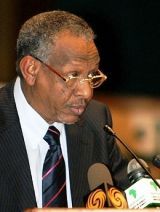Sudanese government proclaims unilateral ceasefire in Darfur
October 27, 2007 (SIRTE, Libya) — The Sudanese government committed to an immediate ceasefire in Darfur at the opening of peace talks on Saturday, but the expected announcement was not met by similar pledges from rebels, who largely boycotted the UN-brokered negotiations.

The U.S. special envoy for Sudan, Andrew Natsios, praised the government for its pledge, but cautioned that there had been dozens of previous ceasefire declarations in Darfur broken by both government troops and rebel factions.
The talks are aimed at ending over four years of fighting that have killed more than 200,000 people in the western Sudanese region of Darfur.
But with no major rebel players at the conference there was little hope that Sirte would lead to a quick peace agreement and mediators said the goal to “create conditions” for effective peace talks to take place.
They said negotiations will also give a larger role to groups representing civilians, which have had little say so far.
“We are going to try very hard to create a framework for the talks,” conference spokesman Ahmed Fauzi said, warning this would be “a long process.”
Immediately after the talks were announced, Abdelwahid al-Nur, founder of the Sudan Liberation Army rebels, said he would boycott until the UN and African Union have deployed a joint force of 26,000 peacekeepers due in January.
Khalil Ibrahim, the leader of the rival Justice and Equality Movement, had initially agreed to the talks, but on Friday announced he was also boycotting because the UN was inviting smaller, less representative rebel factions to attend.
JEM and the main SLA groups say the smaller factions attending are controlled by the Sudanese government. The UN and AU mediators say they tried to make the negotiations as inclusive as possible.
The chief UN mediator, special envoy Jan Eliasson, said the talks’ first priorities were to reach an immediate ceasefire, discuss the return of Darfur refugees to their destroyed villages, and obtain financial compensations for war victims.
“I hope (the government) will show a generous and positive attitude toward this,” Eliasson said.
In attendance were large international delegations that came to be briefed by the UN and the AU on what could be done to build a framework for talks.
“My presence here is a sign of a more active role for the Arab League” in helping resolve Darfur’s conflict, league Secretary General Amr Musa told The Associated Press ahead of the talks.
Egypt, the regional heavyweight, has been criticized for not putting more pressure on its southern neighbour to end the violence. But Foreign Minister Ahmed Aboul Gheit said his government would do its “best to help with a ceasefire and to encourage those who aren’t here to attend.”
Darfur’s ethnic African rebels took arms in 2003 against the Arab-dominated central Sudanese government, accusing it of decades of discrimination. The government is accused of retaliating with mass violence against civilians that has killed more than 200,000 and made over 2.5 million refugees, largely ethnic Africans.
Libyan leader Muammar Gadhafi officially opened the talks Saturday. His increased role in the peace effort is viewed as a pledge by Libya to show it has ended decades of international isolation and can play its part in regional diplomacy.
But many rebels have grown skeptical of the Arab states’ involvement in the peace process, stating they are biased toward Khartoum.
(AP)
